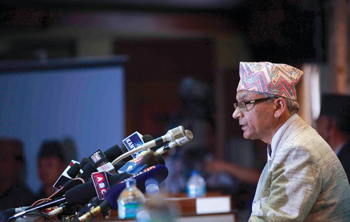The government and EC must be firm, but flexible, to bring the boycotters to the fold

BIKRAM RAI
When the four political parties, egged on by the international community, finally agreed to set up an
interim election government led by the incumbent chief justice in March it was instructed to hold elections in three months. It took the
Chief Justice-cum-Chairman Khil Raj Regmi three months just to set the date for polls.
The blame doesn’t all go to Regmi, of course, because although he formally heads the government it was the four-party syndicate effectively giving orders. And since they couldn’t agree on amending clauses of the electoral laws dealing with delineation of constituencies, the threshold for proportional representation, and the ban on candidates with criminal records, the date for elections couldn’t be set.
Last week, the four parties ran out of excuses for dilly dallying and told Regmi: “You do it.” And on 14 June, the cabinet set 19 November as the date for elections. It is a measure of just how paralysed Nepali politics has become that even setting a belated date for elections is regarded as an achievement. Needless to say, the public greeted the announcement with a yawn. Given the track record of the parties, there is widespread public skepticism that they will stick to even that date.
Indeed, there are still many logistical, technical, and political hurdles to cross between now and November. Nearly three million Nepalis at any given time live and work abroad and not giving nearly a quarter of voters the chance to cast absentee ballots makes a mockery of democracy.
The Election Commission may not have enough time to sort it out, but absentee voting for overseas Nepalis must be an option for the next general election. Another estimated two million citizens who were not yet 18 in the last elections need voter IDs by November. Electronic voting is not going to be feasible because there are just too many political parties, which will prolong vote-counting.
But by far the most worrying aspect is the opposition to elections from the CPN-M, the Madhes Front led by Upendra Yadav, and the newly-formed Federal Socialist Party led by Ashok Rai. Together with 33 other small parties, they oppose elections conducted by the CJ-led government, want the High Level Political Committee disbanded, and aspects of the constitution firmed up before they agree to elections.
None of these demands look so inscrutable that they can’t be resolved through dialogue, which leads us to the conclusion that the small parties just want to be taken more seriously. The dash Maoists, for their part, are bargaining for a greater role in the parent party. Knowing this, the government needs to be firm on conducting elections, yet flexible enough to bring the disgruntled into the fold.
The pressure to accommodate all naysayers may lead to another 601-member CA and we know how unwieldy and unworkable that one was because it served as a rubber stamp body controlled by party whips. Another contentious issue is the one for extending constituencies in the Tarai to reflect new demographics.
One confidence-building measure could be for Regmi to abandon his chief justice post. With poll dates announced, the HLPC has outlived its usefulness and might as well be scrapped. Regmi and the EC must also set strict guidelines to make the polls free of intimidation, vote-buying, and cheating. It must have a code of conduct for campaigning and draw a red line on electioneering that provokes ethnic unrest.
The Big Four are playing politics with the boycotters because of the perceived advantage they see for themselves. The UCPN (M) may find it useful to use the CPN-M to disrupt elections if it feels that it can’t get a majority by November. The NC-UML could be calculating that if it can keep the Maoists divided, it will split the vote. There must be similar electoral calculations about Upendra Yadav among the Madhesi parties.
Whatever the case, we see no compelling reason now not to have elections in November. The new CA may very well get stuck once more on the disagreements that deadlocked the last assembly. We can cross that bridge when we come to it and hopefully better sense will prevail this time.
Read also
Troubled Waters
Regmi Regime
We have got a date
Maybe not June
Let’s face it